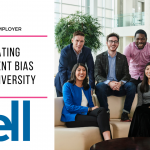 As employers recruiting on campus, you have a lot to work around: class schedules and part-time jobs, not to mention other employers competing for the same talent.
As employers recruiting on campus, you have a lot to work around: class schedules and part-time jobs, not to mention other employers competing for the same talent.
Even once you offer employment to a graduating student, there’s still salary expectations, retention, post-graduate education and even travel plans to contend with sometimes.
A recent survey of graduating undergraduate students by the Canadian University Survey Consortium revealed some important information that every campus recruiter should be aware of as you plan your campus recruitment and onboarding activities for 2013-2014.
Here, we’ve extracted the details from the report that are most valuable for campus recruiters:
- Hours of part-time work per week
- Unemployment, under-employment and job satisfaction
- Salary expectations
- Post-graduation plans – e.g., time off, travel, continuing education
Students’ time is more valuable than ever
Part-time work
Students are working more hours per week than ever before. According to the report, more than half of students are employed either on- or off-campus, working an average of 17.9 hours per week.
In combination with their course loads, this means that some students are working and studying for at least the equivalent number of hours of a full-time job, and therefore fewer students will be available to attend every career fair, information session and recruiting event on-campus. Instead, they’ll likely take their job search online when they have time around their work and studies.
Engineering vs. Business
Where can you focus your efforts? Well, the report says Engineering students are much less likely to be employed during the school year, while Business students are surprisingly most likely to report working 30 hours or more per week. Wow!
Similarly, only 43% of graduating students overall have attended an employment fair, with Engineering students most likely to attend at 68%.
Unemployed, under-employed, unhappy
While many employers aim to complete their entry level hiring while graduating students are still in school, the reality is that only about one third of students report having a job arranged after graduation, with fewer than one in five students landing a full-time job. About half of students reported that they didn’t have a job yet but were seeking work.
- About 6 students in 10 report that their full-time job is permanent
- About 6 students in 10 also report that their job is moderately (20%) or significantly (39%) related to the knowledge and skills they acquired from studies at university
- 23% say it is not at all related
Job satisfaction
Overall, students aren’t ecstatic about the employment opportunities they’re getting. Engineers are most likely to be happy with their jobs, but still fewer than half (47%) said they are very satisfied. Social Science students are least likely to be very satisfied at 24%.
While graduates may become more satisfied with their jobs once the begin working, that’s a dangerous assumption for employers to work from.
Perhaps these statistics present employers with the opportunity to better communicate the benefits of joining your organization throughout the recruitment and hiring process, as well as bolster your onboarding activities between presenting a student with an offer and when they start working.
New grads’ salary expectations
Good news for employers! Most new grads expect entirely reasonable salaries:
- On average, students report anticipated gross annual earnings before taxes and other deductions of about $33,600
- More than 4 students in 10 anticipate an annual income of $25,000 or less
- Fewer than 1 in 5 anticipate a salary of more than $50,000
How does that compare to years past?
- 2003: $39,536 (in 2012 dollars) – almost 18% higher than the average in 2012
- 2009: $39,226 (in 2012 dollars) – 17% higher than in 2012
Young men vs. young women
On average, male students ($40,103) anticipate higher annual earnings compared to female students ($30,102). In fact, 28% of male students expect to earn $50,000 or more after graduating, compared to just 12% of females. Clearly there is still a huge gender divide in Canada’s workforce that extends even to students who are still in school. What is your organization doing to help close that wage gap?
Salaries by discipline
Not surprisingly, students in Engineering programs anticipate the highest average salary: $54,232. This is considerably higher than the next highest discipline, Professional programs, at $40,170. Students in Arts and Humanities programs have the lowest starting annual salary at around $24,764.
Anticipated gross annual earnings before taxes and other deductions

Post-graduation plans
Most new grads aren’t just planning to hunker down and dedicate their lives to their new jobs (if they can get one, that is).
In the first year after graduation:
- Half of students plan to continue their education
- 4 in 10 plan to travel
- 3 in 10 plan to do some unpaid volunteer work
- 1 in 5 plan to simply take time off
Interestingly, about 80% of students plan to continue their education within the next five years, with planning to attend graduate school (58%), professional school (22%) or pursuing further undergraduate studies (20%).
Students’ plans pose some interesting challenges for campus recruiters. Are you willing to be flexible and allow students to travel, do some unpaid volunteer work or take time off before they start working for you?
More importantly, how are you supporting new grads in their goals to continue their education beyond their undergraduate degree?
Photo credit: John Walker





Leave a Reply
You must be logged in to post a comment.